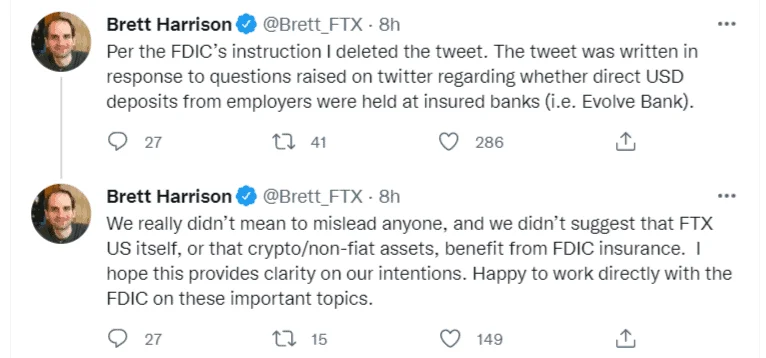For disseminating false or misleading information, the FDIC wrote cease and desist letters to FTX and other cryptocurrency companies.

Five cryptocurrency companies, including FTX US owned by crypto billionaire Sam Bankman-Fried, as well as the news sites FDICCrypto.com, Cryptonews.com, Cryptosec.info, and SmartAsset.com received cease and desist letters from the Federal Deposit Insurance Corporation (FDIC) on August 19.
The FDIC demanded that the previously mentioned businesses stop making “false or misleading statements” about their association with the FDIC.
The FDIC asserted that certain cryptocurrency-related products or services offered by FTX US and the other companies were FDIC-insured.
One such business even registered a domain under false pretenses that “suggests affiliation with or endorsement by the FDIC,” which is expressly forbidden by the Federal Deposit Insurance Act (FDI Act).
The website that FDICCrypto.com reroutes to provides a number of services, including a cryptocurrency service provider.
Perhaps in violation of the Federal Deposit Insurance Act was FTX US
The FDIC claims that by making “false and misleading statements, directly or by implication, concerning FTX US’s deposit insurance status,” FTX US and its affiliated entities may have broken FDIC laws.
Brett Harrison, president of FTX US, reportedly tweeted on July 20, 2022, that direct deposits from the company’s employees were kept in separately FDIC-insured bank accounts. The FDIC cited his exact words, which were as follows:
“Direct deposits from employers to FTX US are stored in individually FDIC-insured bank accounts in the user’s names,” … “stocks are held in FDIC-insured and SIPC-insured brokerage accounts.”
The FDIC also claimed that FTX.US advertised itself as a “FDIC-insured” cryptocurrency exchange on the websites CryptoSec.Info and SmartAsset.com.
“Happy To Work Directly With The FDIC,” says Brett Harrison.
The FDIC made it clear that it does not cover any kind of stocks or cryptocurrencies nor does it insure any kind of brokerage account.
Therefore, FTX US is being sued for using the FDIC’s name improperly because the information it is promoting is completely false.
FTX US must therefore send a written letter to the FDIC within 15 business days of the release’s publication demonstrating compliance with the requests made and outlining all efforts made to have all material linking them to the FDIC removed.
The exchange might be subject to more legal action if it doesn’t abide by the request.
Similar to this, the FDIC sent Cryptonews.com a cease and desist letter for publishing false reviews of cryptocurrency exchanges like Coinbase, Gemini, and eToro while claiming that they are governed and insured by the FDIC.
The tweet’s author, Brett Harrison, President of FTX US, acknowledged earlier today that he did, in fact, write it and made it clear that the FDIC asked him to remove it.
Harrison went on to say that FTX US acted in good faith and reaffirmed the exchange’s dedication to collaborating with American regulators:


